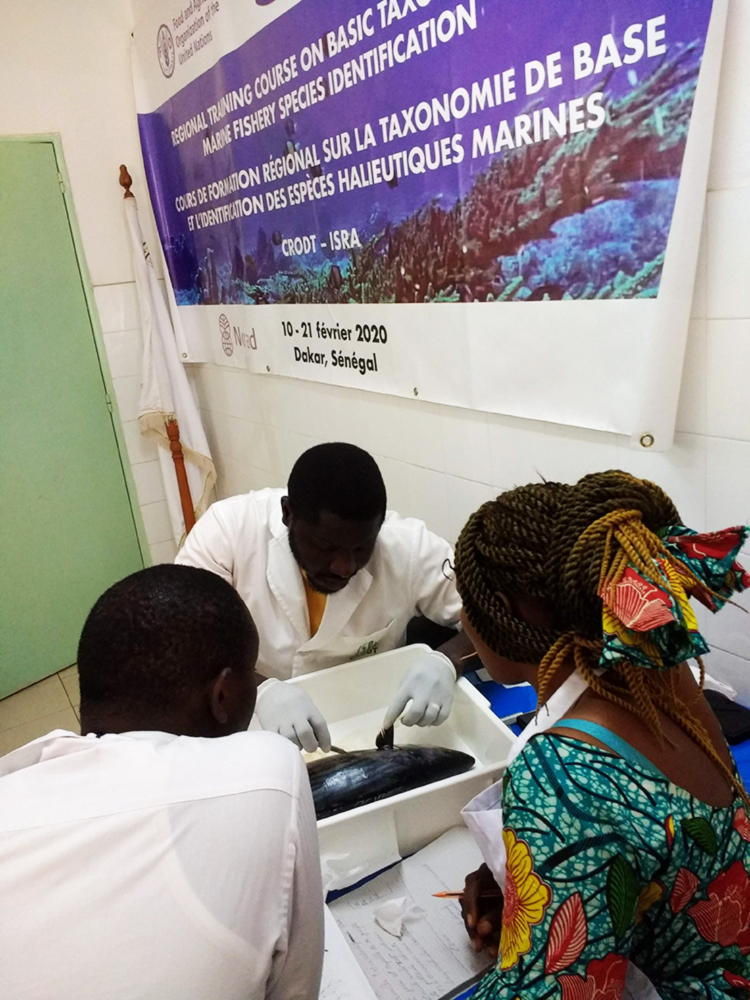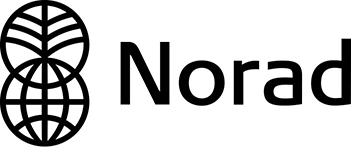Building Africa’s capacity for better fisheries management through taxonomy and marine species identification
The Oceanographic Research Centre of Dakar-Thiaroye (CRODT-ISRA) hosted the first regional knowledge-building workshop on basic taxonomy and marine fishery species identification in Senegal. Held in Dakar from 10 to 21 February, the event was organised to improve knowledge and capacity of local scientists and fishery workers to correctly identify species, when faced with the daily task of collecting and analysing fisheries data at landing sites/fish markets in their countries. These objectives were met through a format composed of theoretical lectures (in English & French) and hands-on sessions, the latter aimed at identification of species belonging to different taxonomic groups, including sharks, rays, bony fishes, shrimps, crabs etc., with an emphasis on groups of commercial value. Eighteen scientists from West African countries: Morocco, Mauritania, Senegal, The Gambia, Guinea Bissau, Sierra Leone, Liberia, and Cape Verde participated in the training run by FAO’s dedicated staff under the EAF-Nansen Programme, and supported by colleagues from CRODT. Two representatives from the Programme’s partnering organisation – the Norwegian Institute of Marine Research (IMR) - also attended the workshop.
 |
 |
| Participants attending the 1st regional training course on basic taxonomy and species identification held from 10 to 21 February in Dakar, Senegal © FAO |
|
For the first time, a taxonomy training course was combined with a field trip to a nearby landing site at Plage de Hann in Dakar. The participants could see with their own eyes fish disembarkation, and study some interesting specimens coming directly from the catches. The composition of species at the landing site was dominated by bony fish, with equally represented components from coastal demersal and pelagic species. Commercially important for the region, small pelagic fish such as Sardinella aurita and Sardinella maderensis occurred, yet in small quantities, due to declining trends in Sardinella catches, according to some regional studies.
Taxonomy courses are organised in connection to the EAF-Nansen Programme’s marine research surveys, conducted with the R/V Dr Fridtjof Nansen. This year’s focus on West Africa will allow some of the workshop attendees to join the scientific cruises and use newly-acquired knowledge to improve identification of species included in the catches and thus elevate the quality of data deriving from the surveys.
These courses are also meant to contribute to the improvement of the quality of fishery statistics in developing countries. Current knowledge on reporting catches to the lowest possible taxonomic level (i.e. species level) is lacking, thus impeding effective and sustainable management of these resources.
 |
 |
| Participants of the course visiting a local landing site in Dakar © FAO |
|
Acclaimed for its great importance towards building effective and sustainable fisheries management at the national and/or regional level, these trainings are organised on a regular basis in the Programme’s partner countries in Africa and in the Bay of Bengal. Similar regional training courses took place in 2019 in Southeast Asia, in 2015 in Mozambique, and in 2016 in Ghana.
The participants of this year’s Dakar course expressed their gratitude towards this EAF-Nansen Programme’s initiative, for the benefit of gaining new set of skills for their work as marine scientists or fishery biologists. Some of them have also expressed intention to organise similar courses for fishery observers in their respective countries, or to develop FAO national species identification guides.
Mr Adama Mbaye on behalf of CRODT has additionally underlined a growing need for these courses in the future, “as a way to foster knowledge-capacity and development, particularly in view of ongoing global threats facing the ocean and marine resources, such as climate change.”
 |
 |
 |
 |
| Practical exercise allowing for the EAF-Nansen course’s participants to study different taxonomic groups © FAO |
|
The EAF-Nansen Programme supports regional and country-specific efforts to reduce poverty, ensure food security and achieve sustainable fisheries management. Capacity development within technical disciplines in fisheries, marine environmental research and fisheries management is an integral part of the EAF-Nansen Programme, and the Programme supports short- and medium-term courses in a number of disciplines based on priorities identified in collaboration with its partners. Within this framework, taxonomy courses, aimed at correct species identification, are recognised as crucial for fishery and environmental research and management. Achieving UN’s Sustainable Development Goals (esp. SDG14) by critical 2030 entails an expanded scope of research and monitoring, including biodiversity concerns. This is well reflected in the Ecosystem Approach to Fisheries (EAF), the framework being promoted by the EAF-Nansen Programme and FAO.
 |

